The surging popularity of vinyl record sales has given a reprieve to retailers under pressure from declining CD sales and the strong growth in online music streaming and downloads.
In 2013, digital music products overtook physical music products for the first time, with digital products taking up 54.7 per cent of the total market.
The impact of this trend is reflected in Australian Industry Record Association (ARIA) figures showing an annual decline in recorded music revenue of 11.6 per cent for the year.
This followed an against the trend result in the 2012 calendar year when revenues increased by 4 per cent – the first growth in the industry since 2009.
But, in an increasingly tough market, a new boom in vinyl sales has thrown record retailers a lifeline and brought young people back into music stores in droves.
Store manager at Red Eye Records in Sydney’s CBD, Matt Huddy, said the boom in vinyl sales was changing the business and bringing in new customers. He said that fifty per cent of music on sale at Red Eye Records was now on vinyl.
“In the last couple of years, it’s grown probably about 400 per cent sales wise. We’ve had new racks built late last year to help display what we’re getting in. We’re getting a much bigger demand for new releases and back catalogues on vinyl,” he said.
“It was about five years ago when vinyl started becoming popular again. Obviously it’s helped. I don’t know if we’d still be here if it wasn’t for that, but who knows.”
ARIA statistics show that vinyl sales were up 77 per cent in 2013 on the previous year, albeit it from a very low base, with 137,658 units being moved last year compared to only 77,934 in 2012.
The trend has sparked talk that vinyl is emerging as a vital new growth area for a niche yet dedicated musical audience who believe it has something unique to offer in an industry increasingly dominated by online sales.
Paul Rigby bought into Australia’s last manufacturer of vinyl records, Zenith Records, about a year ago and believes that growth in vinyl sales will continue for another four or five years. The growth in demand has opened up a new money making opportunity for him and his business partner with their factory pressing about 5,000 records per week.
“One of the things that has been mentioned is that the fans still want to have something that’s by and of the artist they follow. If they are into the band, they want the t-shirt, yeah, they want the CD, yeah, they may download it or whatever. But vinyl is almost king in the merchandise stakes,” he said.
The 44-year-old Mr Rigby said that a recent relocation from Sunshine, in Melbourne’s west, to Brunswick East, had cost approximately $60,000 and that Zenith Records was still in “rebuild” phase. The relocation involved moving three vinyl presses, a cutting lathe, an electroplating facility, electroplating solution and the installation of a steam boiler as well as steamlines and waterlines.
He is hopeful that the business will start to turn a profit after another six months.
“We had to completely wire up the new factory,” he said. “We’ve never really looked at the vinyl side of things as a real cash cow… The vinyl is something we want to do, something we think is important. We want to get our records spot on and as good as what can be manufactured around the world.”
“Entry into this is very difficult. A lot of people dip their toes into the water and see what’s involved and get cold feet. For those reasons we don’t see that there’ll be anyone starting up in China. It’s just not the manufacturing model that appeals to investors.”

